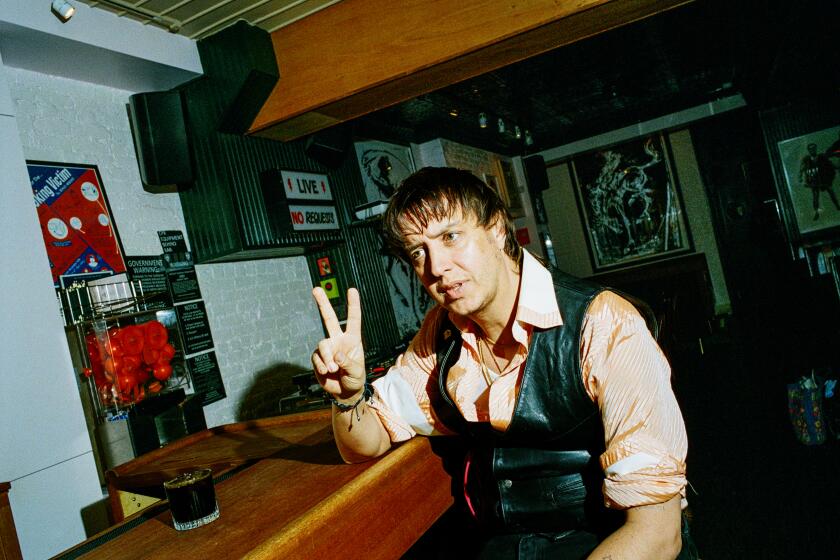Ending his tour of political duty
Panama City — A nosy reporter can’t avoid being drawn to the bulletin board hanging in the sparsely decorated office of Ruben Blades, the salsa star-turned-tourism czar for his native Panama. It’s a humbling “wall of shame,” with critical cartoons and newspaper clips blasting Blades for his performance in public office after being appointed to the Cabinet-level post in 2004.
Blades waves off an aide who considers diverting the reporter’s attention.
“No, let him look at it,” says the acclaimed singer and actor. “Let him see what this thing is all about.”
One 2005 headline reads: “Successful artist; unpopular minister.”
Another blares: “Blades is vulgar and rude, asserts his ex-press director.”
And in a biting cartoon, Blades is skewered with his own lyrics for being out of the office too often, a common critique early in his term. It shows the tourism minister’s empty chair and quotes from one of his most impassioned, political songs, “Desapariciones,” about people who disappeared under Argentina’s military rule.
The caption quotes the chorus, asking: “¿Y donde estan los desaparecidos?” (And where are the disappeared ones?).
Politics aside, Blades’ fans may be asking the same question.
One of the 10 most important songwriters of the last half century in Latin pop music, Blades virtually vanished from the entertainment scene after joining the Cabinet of Panamanian President Martin Torrijos. Worried that critics would accuse a musician of not taking the job seriously, Blades put away his maracas and donned the business suits he hates wearing.
But that self-imposed artistic hiatus may be coming to a close.
El Ministro, as he is addressed here, performed in public last month for the first time since his appointment, taking the stage for Panama’s reenergized carnival celebration, which featured an international summit of salsa groups he helped organize. Flexing his international influence, Blades convened the top bands in the business -- Los Van Van from Cuba, Grupo Niche from Colombia, El Gran Combo from Puerto Rico -- for the weeklong street festival. It was a tropical Woodstock that eclipsed even the mega-concerts of salsa’s heyday in the 1970s.
The salsa summit coincides with Blades’ goal of boosting the cultural profile of this booming Central American nation. But his recent performance, with his regular backup group Editus from Costa Rica, sends a clear message to music fans.
Blades is back.
Unlike many of his salsa peers who have been stuck on the oldies circuit, Blades has remained relevant by pushing the boundaries of his Afro-Caribbean craft. His last studio album, 2003’s “Mundo,” was so eclectic that it won a Grammy not in a Latin category, but for world music.
Still, even Blades may find it tricky to adapt to a market that’s radically different from when he started in the mid-’70s.
Does he worry about attempting a comeback at a time when salsa is suffering a severe commercial slump?
“The era of salsa in New York and Puerto Rico came at a very special time and it cannot be reproduced,” he says. “But the music hasn’t died. The money right now may be in reggaeton, but salsa will always have a future. It’s still there, underground, waiting for the right moment to reemerge.”
Bursting with ideas
LAST summer at his office in Panama City, Blades had been steeped in the business of steering his country’s $1.2-billion tourism industry -- negotiations, contracts, new legislation and his long-term plan to 2020. But when he stopped in Los Angeles last month on the eve of Panama’s carnival, he was bubbling with creative juices and artistic plans -- several new albums, film offers and book ideas.
Much had changed in his life in the intervening months. He got married, quit smoking, lost some weight and some more hair. He wasn’t prepared to say when he might leave his government job. But Blades talked like an artist who was running out of time, not ideas.
More than once, he brought up his age without being asked -- he turns 59 in July. He talked about settling his will and leaving his papers for posterity.
But when he played a sample of his new music in his home office, he sang along and danced like he couldn’t wait to get back onstage. Titled “Cantares del Subdesarrollo” (Ballads of Underdevelopment), the new work is all Blades, literally. He recorded it in his garage studio and played every instrument but bass. The sound is traditional Cuban son, earthy, acoustic and melodic. The lyrics are smart, touching and urgent, with titles like “Pais Portatil” (Portable Country) and “Segunda Mitad del Noveno” (Bottom of the Ninth).
Blades, who has no current recording contract, hopes to land a distribution deal for future albums. One of them is already in the can -- a collaboration with Puerto Rican singer Cheo Feliciano, whom Blades admired and even imitated when he was starting out. In another project, Blades plans to collaborate for the first time with his brother, Roberto, a successful singer and producer based in Miami.
Aside from making music, Blades also wants to write his memoirs, documenting a career that has included some 32 films, 20 albums, seven Grammys, a master’s degree in international law from Harvard University and a failed run for president of Panama. He also envisions a book of his lyrics, commenting on the creation of some 200 songs in his repertoire.
Blades explains his reactivated artistic energy by evoking his 1978 song “Buscando Guayaba” (Looking for the Guava), about life as an endless search.
“We’re never satisfied,” he says, “but to feel dissatisfied you have to have a notion of what you want and what you can attain. As long as you feel restless, you’re never going to reach it. That’s the problem of the creative spirit. So I hope to always feel restless, because the day I stop will be the day my creativity runs out.”
The artist and the art
WHILE Blades may have been lying low for the last 2 1/2 years, his songs have maintained a high profile.
In December, Venezuelan President Hugo Chavez used the Blades song “Tiburon” (The Shark) in his reelection campaign. The song, from 1981’s “Canciones del Solar de los Aburridos” (Songs from the Barrio of the Bored), uses the shark as a metaphor for imperialist superpower intervention in the wars in Central America. Chavez expropriated the lyric -- Blades says without his permission or knowledge -- as part of his strident anti-U.S. rhetoric.
Closer to home, another Blades tune, “El Cantante” (The Singer), has lent its title to the upcoming movie about the late, tormented salsa singer Hector Lavoe, starring Nuyorican power couple Jennifer Lopez and Marc Anthony. Blades says he originally intended to record the song himself, but offered it to Lavoe at the request of producer Willie Colon. It became Lavoe’s signature hit, a melancholy lyric that revealed how the glamour of public acclaim masked the tragedy of his private life.
It’s a theme that seems far removed from Blades today. He was married in August to Luba Mason, a native New Yorker of Slovakian descent and star of Broadway musicals. They met on the set of 1998’s “The Capeman,” the ill-fated Paul Simon musical that also starred Marc Anthony.
The couple share a handsome, two-story home in L.A.’s tony Hancock Park, which Blades bought before taking the job in Panama. While in L.A., Blades exchanges his formal minister’s duds for parachute pants in camouflage green. He seems surprised, and delighted, to learn from his agent that he still gets calls for acting roles. The BBC, in fact, is courting him to consider a role in a film about Iraq -- as Saddam Hussein.
“He’s a dictator, so I keep my mouth shut,” jokes his wife with a big smile.
“I wish you would,” cracks Blades.
The kidding is good-natured. But Blades is the first to confess he doesn’t have the most easygoing personality. Once at a concert, when a fan yelled, “I love you Ruben!” the singer shot back: “That’s because you don’t know me, dear.”
Blades can be funny, generous and charming, an engaging storyteller who enlivens anecdotes with hilarious impersonations. But he can also be stubborn, impatient and irritable, swearing a blue streak at things that bother him.
“I have no patience with idiocy or mediocrity,” Blades says. “But I have a lot of patience for long-term projects. I am intensely tenacious. Once I set my sights on something, I am going to get there. Not stepping over women and children, but I will get there. That I can guarantee you.”
Guarantees, however, are harder to back up in politics.
As a government official, Blades says, he is no longer his own boss. And success isn’t only up to him. He must make the wheels of government turn in the direction he wants them to go. But it isn’t always easy steering the bureaucracy -- or the burro-cracia, as he calls it.
One of his biggest frustrations on the job involves his effort to expand tourism in a remote region known as Kuna Yala, including the San Blas Archipelago, a string of unspoiled islands with pristine beaches and a large coral reef along Panama’s northern coast. Blades spent a lot of time visiting the region early in his tenure, prompting those editorial barbs about his absence from the capital.
The area is populated by a semiautonomous tribe known as the Kuna, who are historically wary of outsiders. Blades opened negotiations with tribal leaders to urge them to accept limited outside investment, which is barred by their laws. As of last summer, he felt he was making progress. But negotiations faltered, an impasse Blades now blames on vested interests resisting competition for existing tourist business in the area.
“This process has helped me very much to understand that there are things you can’t control and that you can’t please everyone,” Blades said.
Other initiatives have been more satisfying. One close to his heart has been a program to train young gang members as tour guides. He recruited them from the streets of the neighborhood where he grew up and where he now owns a home, in the historic center of Panama’s walled city that is being gentrified with chic clubs and restaurants.
Of the initial group of 20 trainees, one was killed and a few dropped out. But for the rest, Blades says, there is hope.
From the start, critics questioned his decision to take the tourism post, a far cry from the presidency he once sought. Some, he says mockingly, pictured him as Panama’s official greeter, singing for tourists arriving at the airport. In the Third World, however, tourism is no joke. It can be the lifeblood of an economy and an engine of development. “I’ve looked at this as a creative job,” he says. “And I’m a better person because this constantly puts you to the test.”
Others wondered why he’d give up a seven-figure salary in the U.S. for government work at $65,000 per year, less than what he could make in one concert.
Blades says simply that he owed it to his country. As an artist, he sang about the problems of the poor in songs such as “Pablo Pueblo” and “Adan Garcia,” portraits of working-class despair. As a government official, he could do more.
“It’s easy to talk,” he says. “It’s another thing to take the risk and give up your comforts and try to do something. The point of ‘Pablo Pueblo’ was to say, ‘Look how this man lives.’ The point of President Torrijos and this government is to say, ‘Let’s change the lives of this man and his family.’ We’ve moved from protest to proposal.”
More to Read
The biggest entertainment stories
Get our big stories about Hollywood, film, television, music, arts, culture and more right in your inbox as soon as they publish.
You may occasionally receive promotional content from the Los Angeles Times.









